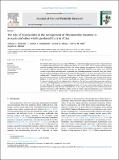| dc.description.abstract | Biopesticides (BPs) are gaining popularity worldwide as a means of managing crop pests. This is largely driven by
the negative effects associated with synthetic pesticide use on human health, the environment, and the growing
concerns regarding chemical residues in food. This review explored the magnitude of BPs use in managing
T. leucotreta in different fruit host plants from the year 2014–2024. SCOPUS journal papers were retrieved
through Google Scholar and categorized by pesticide type, including nematodes, botanicals, fungi, and viruses.
The information searching was done using related terms and synonyms of the major keywords of interest (“False
codling moth”, “Thaumatotibia leucotreta”, “Biopesticides” and “Management”) together with other terms used in
previous studies concerning the formulated study question. A total of 136 articles were identified in the Scopus
database of which only 13 (10 %) articles specifically lay strong evidence that BPs can effectively manage
T. leucotreta thereby significantly reducing fruits infestation. The findings revealed that among the studied in
terventions, entomopathogenic nematodes were the most extensively researched biopesticide agent, particularly
in citrus. Mean while research on entomopathogenic fungi and viruses received some attention. Drawing on
published datasets no study has been documented on the use of plant-derived pesticides (botanical pesticides)
against T. leucotreta on fruits. Therefore, further research is needed to generate information on use and promote
the popularity of the BPs in managing the T. leucotreta, particularly in fruit production in Africa. | en_US |

